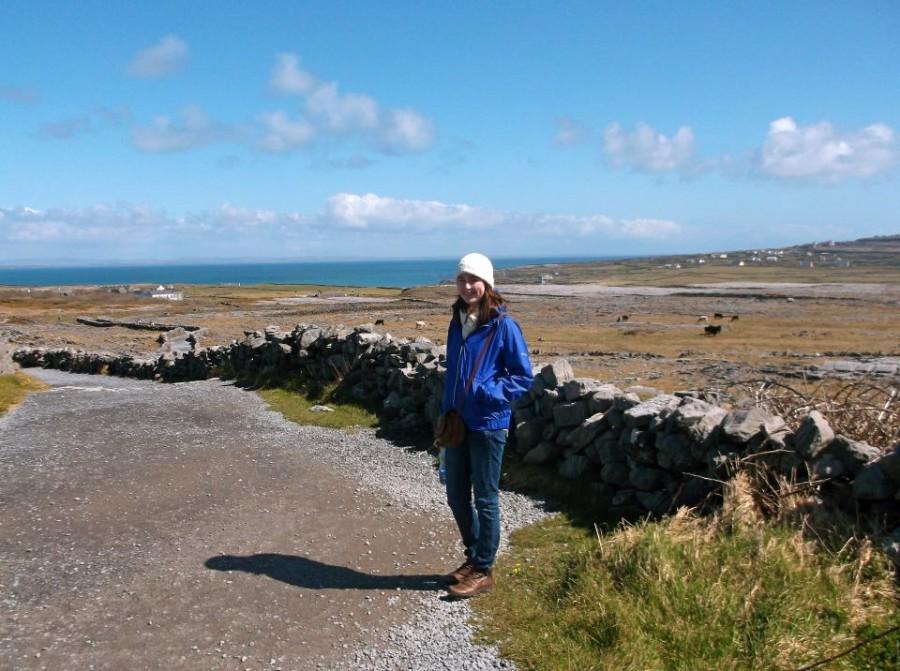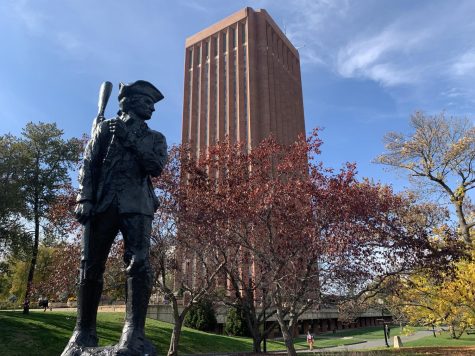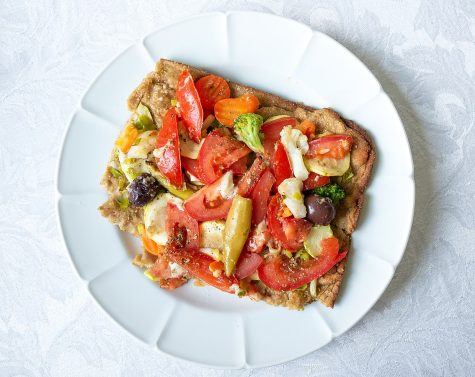Study Abroad: When an American learns Irish
I dragged my hungry, hazy, helpless self off of the bus to pick up the key to my apartment, 103 Gort na Coiribe, which is part of a student residence community in Galway, Ireland. My damp shoes veered around puddles and squished into the office where a kind middle-aged woman carried a stack of papers – until she dropped them.
“For f***’s sake!” she yelled, as her coworkers empathized with lots of words I didn’t understand, but one defined “Jaaaaaysus.” I quietly awaited my key, cautious about the way I asked as not to provoke another explosion.
“Ah sure, you’re grand,” she said and off I went down the first of many small and winding Irish roads.
I’d soon step into my apartment and see that my Irish roommates – who wouldn’t arrive for another week – had made portraits of themselves and their friends on the wall in my sittin’ room (American: living room). Many pictures included words I’d never used in my life, and there they were in such a casual format. At the time I wondered what I’d gotten myself into. How could I, of all people, a girl people often describe as innocent, youthful, childlike, sweet – have been placed in an apartment where the refrigerator door had fallen off, the fire extinguisher missing from its proper place, and a door knob that pulled right off if you wanted it to.
Little did I know that I’d later learn to describe these girls with nothing but positive impressions; I’d even earn a drawing of my own on that sittin’ room wall.
Every worry I’d had about the girls subsided when I met them. Orla was the first one there, and although I was nearly sleepwalking when we met, she insisted we’d get to know each other, as she opened her door and said, “Come sit, we’ll have a chat, I wanna get to know ya like!” I sat on Orla’s bed for about twenty minutes or so as she, in her usual fashion, smoked a cigarette with a mug of Barry’s Tea on her bedside table, asking me questions about my own life and America, what I thought of Ireland so far – for the few hours that I’d been there, anyway – and if I enjoyed going out and havin’ the craic – Irish for a good time.
I met my other roommates, Amy and Rachele, a week later and they asked me where I was from. “You’re from Boston! D’ya know Sean Clarke? Oh, ya must know Sean Clarke, he’s from Boston!”
I didn’t know Sean Clarke.
[slideshow_deploy id=’5971′]
The girls asked if we’d go out with them Monday night, and we agreed. I wondered what it would be like going out on a weekday, as Irish students went home to see their parents every weekend.
On Monday night my American roommate Katherine and I received around sixteen reminders that we were going out later with the girls. I loved it – to feel so included, invited, welcomed into a culture I’d never experienced before. We headed to another apartment for what the Irish call “pre-drinks.”
“I brought my Americans! Everyone, my Americans are here!” We were integrated into their every conversation and activity, as I started to learned one of the most precious aspects of that little community of a country – that it was just that, a community. People got to know each other and people took care of each other, strangers and friends alike.
Over the next couple hours, the girls asked us what sororities were and if America was just like “Mean Girls” and told us to grab a cup from the press (American: cabinet) to make pre-drinks. They told us what “shifting” was, the American “make-out,” so if someone were to ask, “Shift?” or “Will ya shift my mate?” we’d be able to respond appropriately. They also had a collection of words for drunk, including, but not limited to, “locked” or “pissed.” Nothing was too much; language was not avoided at the risk of offending someone else – half the time that was the goal, actually.
In such a green country covered almost entirely in sheep and farmland, it was impossible not to value one another. Ireland offered the complete antithesis of a big city where people, for the most part, ignore one another. An Irish lad I sat next to on my flight home to Boston actually told me that he went to London once and felt sad because no one would talk to him when he was on the subway, whereas in Ireland, you could barely step into a convenience store without having at least a fifteen-minute chat. The “gift of gab,” as they called it, had even rubbed off on me by the time I left, as I talked to this man next to me on that Aer Lingus flight for six hours. You couldn’t leave that country without picking something up; they made sure of it.
But I learned that the language was deeply caring and sensitive for the same reasons that it seemed harsh and outright. Clerks at the grocery store would hear me speak and ask how my parents were – if I was missing my family, where I was from, that they had a cousin in Dorchester, and had I heard of it?
When I think about that unique, charming, harsh, beautiful language, I think about its honesty. Going out to a pub filled with singing lads, the man at the door checking your ID would be singing along with the crowd inside, belting, “Her eyes, they shone like diamonds/I thought her the Queen of the land…” Everyone connected by song, history, the scarf they’d purchased at Penney’s, the stack of papers that fell on the floor – connected by feeling, by ideas, by language. And there I was, key in hand, already a part of it all.
Katie McKenna is a UMass Journalism student who studied at the National University of Ireland in spring, 2013.






